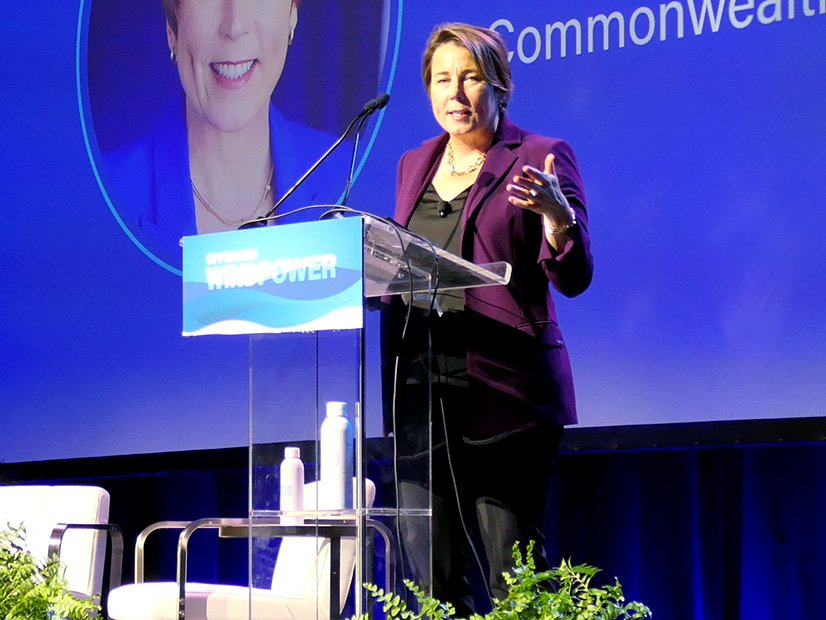BOSTON — Massachusetts, Rhode Island and Connecticut have reached an agreement on coordinating the procurement of offshore wind, Massachusetts Gov. Maura Healey (D) announced Wednesday.
Healey touted the benefits of the multi-state agreement at the American Clean Power (ACP) Association’s Offshore WINDPOWER 2023 conference, stressing the importance of regional collaboration and the potential of the agreement to benefit ratepayers.
“Through this agreement, here’s what we’re going to do: Align our procurements to leverage our collective buying power, lower project costs and maximize benefits for ratepayers across the region and increase the efficiencies and reduce project risk for offshore wind developers,” Healey said at the conference.
The Massachusetts governor added the states collectively have the authority to procure up to 6,000 MW of offshore wind capacity. According to the memorandum of understanding (MOU), the state agencies will “work in good faith to ensure that multi-state bids are considered.”
Under the agreement, multi-state bids could be extended to just two of the states, or all three. Each of the states are in various stages of the RFP processes for new procurements. Massachusetts has issued the largest solicitation of the three states at up to 3,600 MW, with proposals due in January. (See Mass. DOER Issues Draft RFP for Region’s Largest OSW Solicitation).
“Regional collaboration through this three-states MOU will not only help in advancing offshore wind projects of large scale by securing cost-effective energy prices for ratepayers — but it also provides a significant opportunity for long-term economic development,” Rhode Island Gov. Dan McKee (D) said in a press release.
The announcement — and the conference that hosted it — come at a crucial time for the region’s offshore wind industry, as supply chain constraints and high interest rates have strained existing power purchase agreements (PPA).
On Monday, Avangrid and two Connecticut electric utilities announced the termination of the PPA for the 804-MW Park City Wind project (Conn. PURA 19-12-18, see Park City Wind to Cancel PPAs, Exit OSW Pipeline). Meanwhile, the Massachusetts Department of Public Utilities approved the termination of the SouthCoast Wind PPA on Friday (Mass. DPU 20-16, 20-17, 20-18) following the termination of the Commonwealth Wind PPA earlier this summer (Mass. DPU 22-70, 22-71, 22-72, see Commonwealth Wind PPA Cancellations OK’d).
Healey doubled down on the importance of offshore wind, calling it “an anchor for our state’s short-term and long-term success,” despite the recent industry challenges.
Several speakers at the conference praised the agreement. Pedro Azagra Blázquez, CEO of Avangrid, said the agreement is necessary and “very important,” in his remarks following Healey’s.
ACP called the agreement “a bold way to drive cost efficiencies for projects across a broad swath of New England while promoting economic growth, enhancing security and driving down energy costs.”
“Procurement at this scale is exactly what industry needs to solve some of its most pressing issues,” said Liz Burdock, CEO of the Business Network for Offshore Wind, in a statement. “Big scale drives real cost reductions, fosters a pipeline large enough for new manufacturing investments and should create enough certainty to entice developers and vessel owners to enter into framework agreements that would unlock capital sitting on the sidelines.”
Throughout the conference, speakers expressed both optimism about the long-term outlook for the industry and the concern that if the current round of procurements fails to produce meaningful results, supply chain issues could push back the in-service dates of the next round of projects into the 2030s. Such a delay could significantly hinder the ability of states to meet their emissions reduction targets.
Bob Grace, president of Sustainable Energy Advantage, called the multi-state agreement “somewhere between a very big deal and not a big deal,” noting that Massachusetts, Connecticut and Rhode Island previously participated in the joint procurement of renewable energy in 2015-16. The joint procurement resulted in a mix of land-based wind and solar projects, selecting proposals totaling 460 MW.
Grace said the experience was extremely unwieldy as each state’s laws and procedures became constraints on their neighbors and was a process that many involved vowed never to repeat. He said the announced offshore wind agreement appears to learn from that experience by coordinating procurements rather than jointly procuring. He added the benefits of the agreement will hinge upon how effectively the states can work together.
“There is no way for the New England states to hit their climate goals without offshore wind,” Grace said.
While many policymakers in the region have pushed to get as much offshore wind in the project pipeline as soon as possible to reduce emissions, Massachusetts Attorney General Andrea Joy Campbell (D) has expressed concern about the size of Massachusetts’ recent solicitation.
In her initial comments on the solicitation, Campbell said timing these procurements during a period of cost increases could leave ratepayers with inflated bills (Mass. D.P.U. 23-42). The state Attorney General recommended capping the maximum procurement at 1,600 MW instead of 3,600 MW, with smaller, more frequent procurements to follow the solicitation.
This strategy “likely would help moderate the pace of offshore wind procurement and protect ratepayers from the volatility in the current market,” Campbell said.
While announcing the states’ agreement, Healey stressed the importance of federal support for offshore wind to keep costs manageable.
“A critical piece of this is how we’re able to maximize federal funding,” Healey said, highlighting the administration’s application for an up-to-$250 million matching grant from the U.S. Department of Energy for transmission upgrades that would help connect offshore wind to the grid.
Healey called on conference attendees to help push the federal government for more support for the offshore wind industry.
“This is a federal administration that has purported to be about a clean energy transition,” Healey said. “Hold them accountable.


